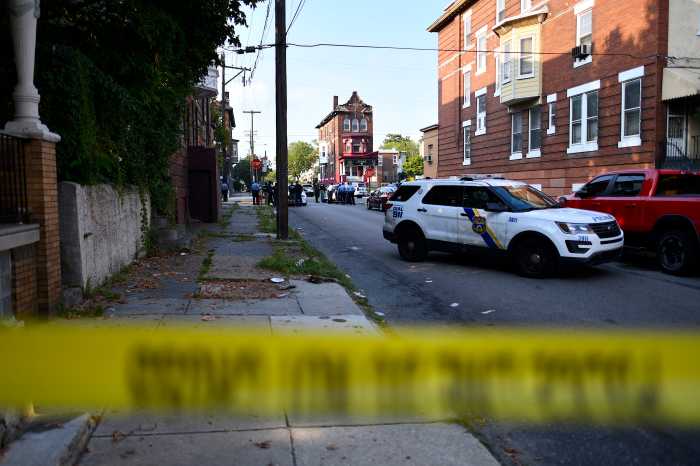In a blow to District Attorney Larry Krasner, the Pennsylvania Supreme Court on Wednesday denied his office’s attempt to challenge a state law governing when police officers are justified in shooting a suspect.
The legal fight was part of the case involving former Philadelphia Police Officer Ryan Pownall, 40, who still faces third-degree murder charges in connection with the 2017 on-duty killing of David Jones.
State Supreme Court Justice Kevin Dougherty, in a concurring opinion, reprimanded Krasner, questioned prosecutors’ ethics and wrote that he “cannot say the DAO has treated Pownall fairly and equally.”
Krasner’s team in Pownall’s case was seeking to alter jury instructions based on a state law known as Section 508.
Section 508 says officers are justified in shooting a suspect if such force is needed to prevent a person from fleeing and the suspect “has committed or attempted a forcible felony or is attempting to escape and possesses a deadly weapon, or otherwise indicates that he will endanger human life or inflict serious bodily injury unless arrested without delay.”
Pownall pulled over Jones, who was riding a dirt bike, in June 2017 in Feltonville and found a gun after frisking him, according to information authorities presented to a grand jury.
Following a physical altercation, Pownall allegedly attempted to fire at Jones, but his gun jammed. Jones, the grand jury reports says, threw his gun away and ran away before Pownall shot him twice in the back. Pownall was later fired as a result.
The DAO, in court filings, argued that Section 508 gave too much leeway to law enforcement, violating the Fourth Amendment to the U.S. Constitution, as interpreted by the U.S. Supreme Court in a 1985 ruling.

That decision, Garner v. Tennessee, found that police were not justified in shooting a suspect just because they were fleeing, unless an officer reasonably believes they or members of the public are in danger.
Krasner’s office argued in favor of changing Section 508’s “ors” to “ands,” meaning all the conditions must be meant for an officer to legally use deadly force.
Dougherty, who also wrote the majority opinion, determined that the motion was improper and essentially asked the court to decide Pownall’s fate before his trial.
“We agree the issue warrants serious examination, by every facet of government as well as those outside of it,” he wrote. “But the proper forum for that debate is not an interlocutory appeal of a pretrial motion challenging a suggested jury instruction that might not even be applicable.”
In the concurring opinion, Dougherty questioned several aspects of Pownall’s prosecution, including whether proper information was provided to the grand jury and whether prosecutors should have been able to bypass a preliminary hearing.
The timing of the DAO’s Section 508 motion “was more than just frustrating: it also raises ethical concerns,” Doughery wrote.
Krasner’s office filed the legal challenge days after Pownall’s attorney sought to have the charges dropped and weeks before the trial’s scheduled start. The DAO motion was not approved by the lower court and halted the proceedings.
Jane Roh, a DAO spokesperson, said Wednesday that the office is “considering our options for appeal at this time.”
“The Pennsylvania Supreme Court exists to review the constitutionality of legislation,” she said in a statement. “They failed to meet that obligation here. We respectfully disagree with the majority opinion.”
Pownall’s attorney, Fortunato Perri Jr., could not be reached for comment Wednesday. Court documents show a trial could be held as soon as Aug. 1.
Two of the six state justices disagreed with the ruling, and Justice David Wecht said in a dissenting opinion that Section 508 is “at least in part, constitutionally defective.”
Wecht wrote that he would strike down two of the conditions in which an officer is authorized to use deadly force on an escaping suspect — if the person has committed a forcible felony and if they possess a deadly weapon.
Even so, he added, the new law, which would be based on danger to law enforcement or the public, could not be applied in Pownall’s case, since the fatal shooting occurred under the old regulations.



























